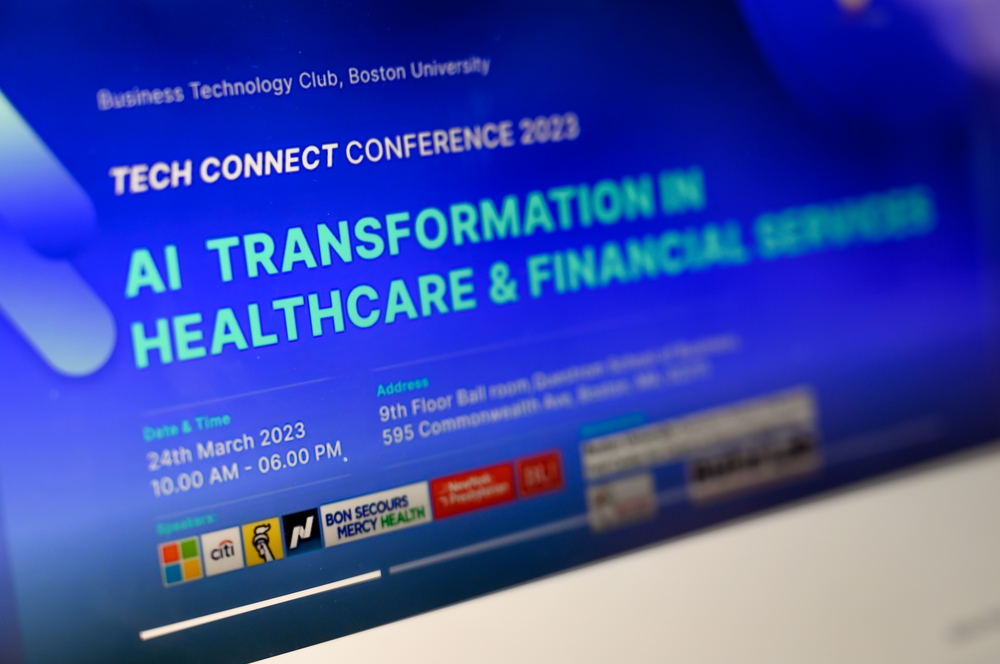Since the days of Alan Turing and Isaac Asimov, the symbiotic worlds of science and science fiction have been weighing the opportunities provided by artificial intelligence against its potential detriment. With recent, heavily publicized breakthroughs, AI is on the minds of many, including some members of the Boston University Business Technology Club.
Business students and industry professionals attended the club’s 2023 Tech Connect Conference at the Questrom School of Business on March 24 to discuss the impact of AI on healthcare and financial services.
Krishna Agrawal, president of the Business Technology Club and a master’s student pursuing a dual degree in Business Administration and Digital Technology at Questrom, said the event featured “insightful speakers” including healthcare panels and a financial services panel.

“We had an amazing turnout,” Agrawal said. “The topics discussed were very diverse and people were also able to relate with the topics and the format was mostly of the storytelling type, so that it’s easily understood by anyone.”
The event included talks from personnel at Citi, Liberty Mutual, Nasdaq and local hospitals, discussing the ways AI had changed their industries, and how it would continue to do so.
Steve Idowu, senior manager at Liberty Mutual and a speaker at the event, said he thinks it’s great to bring professionals together across disciplines to talk about AI, which is relevant in this day and age.
“As a professional myself, I learned a lot about what these guys are doing that maybe we’re also doing at work, or new opportunities that potentially we can explore,” Idowu said.
Agrawal said the event had a lot of networking, which is “highly valuable for people” interested in pursuing a career in business and technology.
Michael Salerno, vice president of Portfolio Operations at Bon Secours Mercy Health, also found the experience informative.
“I’ve been able to interact and network with some folks from the financial markets … just getting the perspective of the experts in those industries,” Salerno said.
One attendee, Immanuel John, a club officer pursuing a dual MBA and Management Science degree, said he thinks AI is going to “hit every industry” and be a part of people’s “day-to-day applications.”
“As long as you can identify a certain pattern, and you can say that this is how certain things are supposed to be run, that’s where … AI comes into the picture,” John said.
Many people feel AI might replace jobs, but Salerno said human employees will be “complemented with AI.”
Tod McKenna, the director of securities services at Citi, said that the implementation of AI will create new jobs due to the maintenance necessary to operate the software. McKenna also said AI will remove the “redundant, repetitive” activities from work, which will allow human employees to maximize their potential.
However, he said some jobs may disappear, just as they did in the Industrial Revolution.
“It may mean that ultimately, there are some manual labor positions that are going to disappear because of robots,” McKenna said. “The important thing to keep in mind is that this next generation of AI is really designed to augment our staff as opposed to replace it.”
Idowu said AI doesn’t replace humans, rather, it supports them.
“The human brain is so powerful,” Idowu said. “There’s a lot of values we can bring as humans that machines cannot provide right now.”
John said he doesn’t think the workforce should be worried about AI, but as Idowu said, it will have an influence on the way we work.
“The transformation is happening, and it’s happening fast,” Idowu said. “I hope that we all consider ways that this is impacting our lives, and ways that we can have influence on how this is being used.”





















































































































